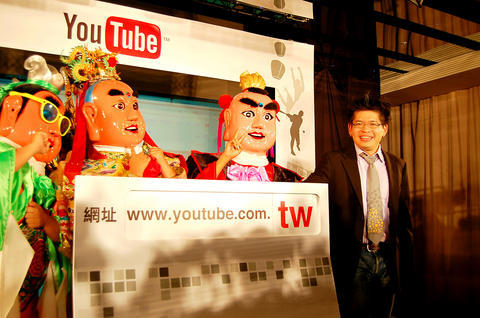YouTube LLC, the world's most popular video-sharing site, yesterday launched a Taiwanese site.
The launch of the site pits YouTube against Wretch Co (
YouTube was acquired by Google last October for US$1.65 billion, while Wretch -- a comprehensive online community providing blog, photo and video sharing service -- was purchased by Yahoo's local unit, Yahoo-Kimo Inc (

PHOTO: WANG PEI-HUA, TAIPEI TIMES
"We will keep innovating and bringing the best products to local users instead of focusing on the competition," YouTube chief technology officer and cofounder Steve Chen (
"We hope that at the end of the day, users will choose us," Chen said.
YouTube's Taiwan site allows local users to search and view video content faster and easier, Chen said. It will also help to reinforce connections and experiences within the local community, he said.
YouTube already has local sites in Japan and Hong Kong.
The Taipei-based online market research firm InsightXplorer Ltd (
Wretch not only has a Chinese-language platform, but also a service backed by a local team to which users can directly provide feedback and report technical problems, Yahoo-Kimo public relations supervisor Ruu Wu (吳苑如) said.
YouTube has many underground resources from Google, YouTube international manager Sakina Arsiwala said.
As YouTube is built upon users' needs, when the demand in Taiwan surges significantly, then YouTube will set up a local team, Arsiwala said.
Google has demonstrated its strong ambition in cultivating the Taiwanese market since it established a research and development team here in June last year. The company launched a local version of Google Maps to boost traffic last Friday.
Google Taiwan is also on the way to work with telecom operators for users to upload and view video clips on YouTube from their handsets, Google Taiwan strategic partner manager Sean Lien (連祥一) said, without providing a timetable.
The launch of various Chinese-language sites is aimed at boosting Google's ad revenues from Taiwan. Rebecca Kuei (張成秀), Google Taiwan's head of sales and business development, refused to reveal the growth of ad sales in Taiwan.

Quanta Computer Inc (廣達) chairman Barry Lam (林百里) is expected to share his views about the artificial intelligence (AI) industry’s prospects during his speech at the company’s 37th anniversary ceremony, as AI servers have become a new growth engine for the equipment manufacturing service provider. Lam’s speech is much anticipated, as Quanta has risen as one of the world’s major AI server suppliers. The company reported a 30 percent year-on-year growth in consolidated revenue to NT$1.41 trillion (US$43.35 billion) last year, thanks to fast-growing demand for servers, especially those with AI capabilities. The company told investors in November last year that

Intel Corp has named Tasha Chuang (莊蓓瑜) to lead Intel Taiwan in a bid to reinforce relations between the company and its Taiwanese partners. The appointment of Chuang as general manager for Intel Taiwan takes effect on Thursday, the firm said in a statement yesterday. Chuang is to lead her team in Taiwan to pursue product development and sales growth in an effort to reinforce the company’s ties with its partners and clients, Intel said. Chuang was previously in charge of managing Intel’s ties with leading Taiwanese PC brand Asustek Computer Inc (華碩), which included helping Asustek strengthen its global businesses, the company

Taiwanese suppliers to Taiwan Semiconductor Manufacturing Co. (TSMC, 台積電) are expected to follow the contract chipmaker’s step to invest in the US, but their relocation may be seven to eight years away, Minister of Economic Affairs J.W. Kuo (郭智輝) said yesterday. When asked by opposition Chinese Nationalist Party (KMT) Legislator Niu Hsu-ting (牛煦庭) in the legislature about growing concerns that TSMC’s huge investments in the US will prompt its suppliers to follow suit, Kuo said based on the chipmaker’s current limited production volume, it is unlikely to lead its supply chain to go there for now. “Unless TSMC completes its planned six

TikTok abounds with viral videos accusing prestigious brands of secretly manufacturing luxury goods in China so they can be sold at cut prices. However, while these “revelations” are spurious, behind them lurks a well-oiled machine for selling counterfeit goods that is making the most of the confusion surrounding trade tariffs. Chinese content creators who portray themselves as workers or subcontractors in the luxury goods business claim that Beijing has lifted confidentiality clauses on local subcontractors as a way to respond to the huge hike in customs duties imposed on China by US President Donald Trump. They say this Chinese decision, of which Agence